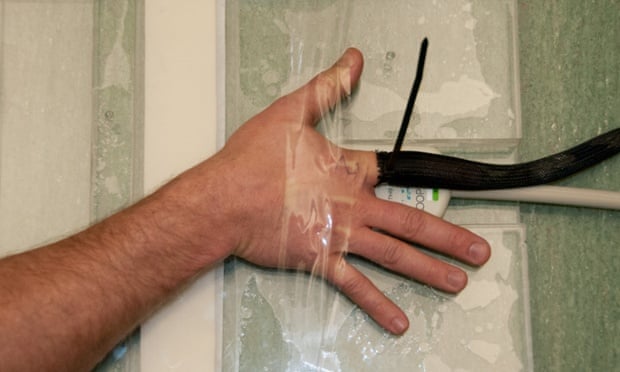
(From The Guardian)
WHY DO KNUCKLES POP?
As many scientists have wondered-

Fryer’s hand, attached to the finger-puller and immobilised ready for scanning. Photograph: University of Alberta
some without a stop--
and quite a few have blundered:
just why do knuckles pop?
It has nothing to do with their dimension,
instead, it's a matter of surface tension.
In 1947, a pair of doctors at St Thomas’s Hospital in London performed their own investigation into the nature of knuckle cracks. They tied a cord around volunteers’ fingers and got them to tug until the joint went pop. They captured it all with x-ray images. A tension of about 7kg was needed to elicit a pop, during which the bones in the knuckle separated by about half a centimetre.
The doctors concluded that the crack sounded when the joint surfaces were suddenly wrenched apart. This caused a sudden drop in pressure in the synovial fluid between the joints, and the formation of a vapour cavity, or bubble. One cracked, it took 20 minutes of rest before the same knuckle would crack again.
This was confirmed,if you need such assurance,
more recently using an MRI,
but better have good medical Insurance,
if it too you'd like to try.
HZL
4/16/15
Writing in the journal, Plos One, Kawchuk describes how every crack occurred as the joints suddenly separated, and a gas-filled pocket appeared in the synovial fluid that lubricates the joint. The bubble comes from gas that comes out of the fluid as the pressure in it drops, just as bubbles appear in freshly opened bottles of fizzy drinks. “If you’ve ever washed up glass plates, you’ll know they can be hard to separate when they are wet. The film of water between them creates a tension that needs to be overcome. It’s similar with joints. When you pull on them, they resist at first, and then suddenly give way,” said Kawchuck.
The results suggest that the London doctors hit on the right explanation in 1947. Kawchuk does not rule out other effects though, that were not picked up by the MRI scanner. “We have to be cautious,” he said.
But what use is the answer? Apart from solving, perhaps, a long-standing mystery, Kawchuk said the work could potentially help doctors understand why some people can crack their knuckles and others not. “The ability to do this can sometimes change in people over time. Maybe we can use it to ascertain the health of their joints. It could give us fresh insights,” he said.

No comments:
Post a Comment